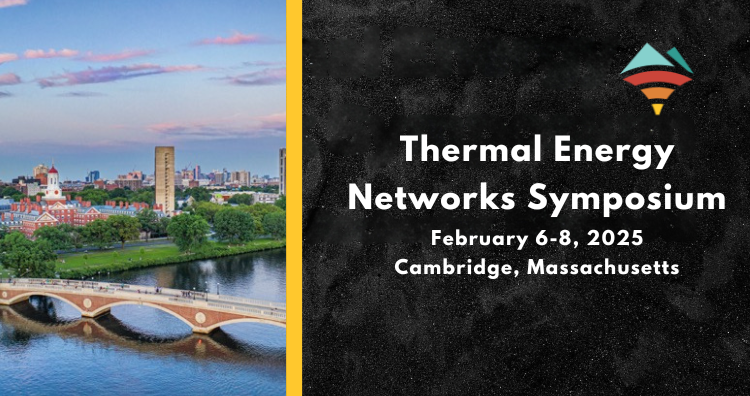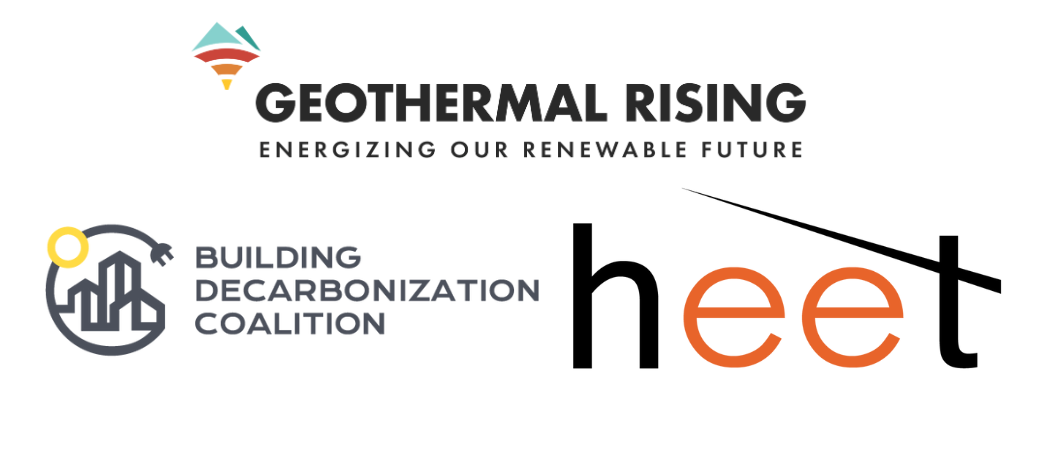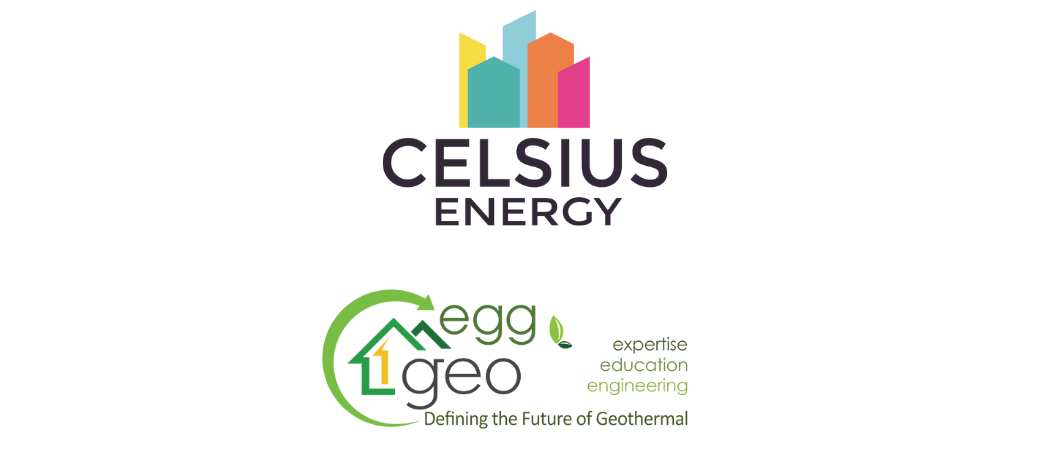Thursday, February 6
6:00 PM – 8:00 PM | Registration
6:30 PM – 8:00 PM | TEN’s Symposium Welcome Reception
Friday, February 7
7:30 AM – 5:00 PM | Registration
8:00 AM – 9:00 AM | Networking Breakfast
9:00 AM – 11:00 AM | Opening Plenary Session
- Welcome Remarks
- Keynote Remarks
- Fireside Chat
- Panel: Navigating Federal and State Policies for Geothermal and Thermal Energy Networks: Opportunities, Challenges and Future Directions
This panel will explore the evolving landscape of federal and state policies shaping the development, deployment, and integration of geothermal and thermal energy networks in the U.S. With increasing attention on decarbonization and energy security, geothermal and thermal energy systems are gaining traction as sustainable alternatives for heating, cooling, and power generation. However, regulatory frameworks, incentives, and policy barriers vary significantly at the federal, state, and local levels, presenting both challenges and opportunities for stakeholders in the industry.
11:00 AM – 11:30 AM | Networking Break
11:30 AM – 12:30 PM | Concurrent Sessions 1
- Applied Session - Track 1A: Building Affordable Thermal Energy Networks
The success of utility-scale thermal energy networks depends on bringing down the costs. Using history of innovation as a guide, we may be at the peak of the “cost curve,” with market saturation, optimized system designs, and declining costs on the horizon—that is, if we take the right lessons from UTEN pilots. This panel will examine cost drivers in UTEN pilot projects, explore the opportunity to integrate electric grid savings into TENs costs and rates, and compare the costs of these systems to a business-as-usual approach to heating and cooling.
- Engineering & Design Session - Track 1B: Benefits and Challenges of Geothermal and TENs: Synergies with Microgrids and Lessons Learned from District Energy Systems
As geothermal energy technologies and thermal energy networks emerge as transformative solutions, this panel will explore challenges and opportunities to accelerate deployment.
Panelists will address the technical, financial, and regulatory challenges of deploying thermal energy networks at scale and strategies to overcome them based on their similarities with other community energy systems like district energy or microgrids.
Additionally, the session will highlight the potential for synergy between thermal energy networks and microgrids, illustrating how the integration of centralized power and thermal generation can unlock new opportunities for decarbonization and energy efficiency.
This session is ideal for industry leaders, city planners, policymakers, researchers, and stakeholders seeking to understand the next frontier of energy solutions at the community scale.
12:30 PM – 1:30 PM | Networking Lunch
1:30 PM – 2:30 PM | Concurrent Sessions 2
- Applied Session - Track 2A: Financing and Cost Recovery Mechanisms for Thermal Energy Networks (TENs) and Geothermal Energy Networks (GENs)
Thermal energy networks, like other energy infrastructure, need to find sources of financing and then apply a cost recovery model within acceptable timeframes. This is non-trivial for TENs. These systems require significant long-term thermal investments, but many of the operational benefits will be realized by others. The panelists will explore ways to monetize the benefits of TENs and identify cost recovery models necessary to make TENs scalable and sustainable.
- Engineering & Design Session - Track 2B: Learn How Municipalities and Utilities are Engineering and Designing TENs
With one TEN operational and multiple others in various stages of design, this session will explore the similarities and dissimilarities that municipalities and utilities are experiencing while designing their TEN for their specific locations. Panelists include representatives from municipalities, utilities and engineering firms.
2:30 PM – 3:30 PM | Concurrent Sessions 3
- Applied Session - Track 3A: What's in a Name? How We Can Come to Terms on Nomenclature: Words Matter
The language we use to describe geothermal technologies shapes how stakeholders understand, adopt, and support these systems. This session will explore the balance between clarity and precision to build trust and drive action. Through the perspectives of diverse audiences -- the public, policy-makers, designers -- panelists will unpack the risks of both ambiguous language and jargon, and highlight opportunities for fostering a united front. Together, we’ll examine the importance of alignment, the power of language to inspire confidence, and strategies to ensure geothermal’s potential is communicated effectively at every scale.
- Engineering & Design - Track 3B: The Gas-to-Geo Transition
The Gas-to-Geo Transition is long-term process with multiple stakeholders and considerations. This session will be a robust discussion on considerations in designing Thermal Energy Networks with a multi-disciplinary team of experts, it will attempt to be a holistic analysis. Topics will range from socializing the idea with key stakeholders, working with local trade unions and public entities, as well as key technical concerns during and after drilling.
3:30 PM – 4:00 PM | Networking Break
4:00 PM – 5:30 PM | Concurrent Session 4
- Applied Session - Track 4A: Striking the Balance: The Regulatory Role for TENs
Eight states have passed legislation either allowing or mandating utility-scale thermal energy networks. Now it’s up to regulators to decide how these pilots will proceed -goals of the pilots, what should be measured, where they should be sited, what designs are allowed, what can be included in the rates, potential ownership models and so much more. The question is what is absolutely necessary and desirable and what should the market figure out. What is too much or too little regulation? How can regulation help scale TENs with the necessary guardrails to protect the rate payer, labor, and the environment?
- Engineering & Design Session - Track 4B: Modern Best Practices for Design and Construction of Thermal Energy Networks (TENs)
There are good, better, and best practices for the design and construction of energy networks. This panel will present and discuss the latest practices for both design and construction of Thermal Energy Networks. Panelists include mechanical code development officials, engineering design professionals and construction personnel from across the industry.
5:30 PM – 7:30 PM | Networking Reception
Saturday, February 8
8:45 AM – 12:00 PM | Framingham Geothermal Energy Network Pilot Project Tour
Get an up-close look at the cutting-edge Geothermal Pilot Project in Framingham, Massachusetts! The Framingham geothermal energy network (GEN) demonstration project from Eversource Energy is a first-of-its-kind utility-led retrofit GEN project at a neighborhood scale. The project consists of 1 mile of a single ambient temperature loop providing 375 tons of heating and cooling to 36 buildings – 24 residential and five commercial – serving a total of 125 individual customers. The building stock consists of single family homes, apartment buildings from the Framingham Housing Authority, a fire department, a public school, a gas station and a retail store. Three borefields with a total of 90 boreholes serve as the heat source and sink for the system. Fiber optic cable was installed by HEET in 14 of the boreholes to monitor the temperature in the subsurface during the lifetime of the system.
The construction phase of the project was from the Summer of 2023 to the Summer of 2024. The project is now operational and is in the final stages of the commissioning phase. Additionally, an expansion loop that connects to the original project was designed in 2024 as part of a grant that HEET received from the Department of Energy (DoE).
Most of the tour will be outside – comfortable walking shoes and appropriate winter weather clothing is highly recommended.
Tour Itinerary:
- 8:45 AM – 9:00 AM: Bus loads @ Boston Marriott Cambridge
- 9:00 AM – 9:30/9:45 AM: Travel to Framingham
- 9:30/9:45 AM – 10:45 AM: Framingham Tour*
- 10:45 AM – 11:00 AM: Bus loads
- 11:00 AM – 11:30/11:45 AM: Return to Boston Marriott Cambridge
*The duration of the tour will vary depending on the number of questions and time spent at various tour locations.
Limited space available on a first-come, first-served basis for registered attendees only. Although there is no additional fee, separate registration is required. Questions? Contact us Registration@geothermal.org.
Agenda subject to change.



